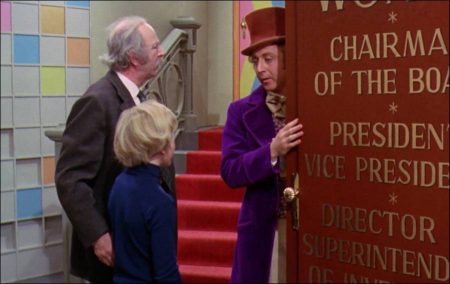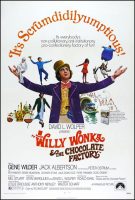Willy Wonka and the Chocolate Factory movie storyline. In a small town, Charlie Bucket (Peter Ostrum), a poor paperboy, watches kids visit a candy shop. Walking home, he passes Willy Wonka’s (Gene Wilder) chocolate factory. A mysterious tinker recites the first lines of William Allingham’s poem “The Fairies” and tells Charlie that “nobody ever goes in, and nobody ever comes out.”
Charlie rushes home to his widowed mother and bedridden grandparents. That night, Charlie tells his Grandpa Joe what the tinker said, and Joe reveals that Wonka locked the factory because other candy makers, including his rival Arthur Slugworth, sent in spies to steal his recipes. Wonka shut down the factory but resumed selling candy after three years. The origin of Wonka’s labor force is unknown.
Wonka announces he has hidden five “Golden Tickets” in chocolate Wonka Bars. Finders of the tickets will receive a factory tour and a lifetime supply of chocolate. The first four tickets are found by the gluttonous Augustus Gloop, the spoiled Veruca Salt whose family is wealthy in the nut business, the gum-chewing Violet Beauregarde, and the television-obsessed Mike Teavee.
As each winner is announced on TV, a sinister-looking man whispers to them. A subsequent news report reveals the fifth ticket was found in Paraguay by a millionaire / casino-owner, causing Charlie to lose hope. The next day, Charlie finds money in a gutter and uses it to buy a Wonka Scrumdiddlyumptious bar; with the change, he buys a regular Wonka Bar for Joe. While walking home, Charlie overhears that the millionaire forged the fifth ticket. Charlie opens the Wonka Bar and finds the fifth ticket. Rushing home, he encounters the same man seen whispering to the other winners, who introduces himself as Slugworth and offers a reward for a sample of Wonka’s latest creation, the Everlasting Gobstopper.
Returning home with the Golden Ticket, Charlie chooses Joe, who, in excitement, rises out of bed for the first time in 20 years, as his chaperone. The next day, Wonka greets the ticket winners and leads them inside, where each signs a contract before the tour. The factory includes a candy land with a river of chocolate and other sweets. The visitors meet Wonka’s labor force, small men known as Oompa-Loompas.
Despite being asked not to by Wonka, Augustus drinks directly from the chocolate river, but falls in and is sucked up by a pipe to the Fudge Room. Wonka takes the remaining guests on a surreal boat ride, leading to the Inventing Room, where everyone receives an Everlasting Gobstopper. Violet blows up into a large blueberry after chewing an experimental piece of three-course dinner gum over Wonka’s warnings and must be squeezed before she explodes.
The remaining group samples some lickable wallpaper and then reaches the Fizzy Lifting Drinks Room, where Charlie and Joe ignore Wonka’s warning and sample the drinks. They float and have a near-fatal encounter with an exhaust fan before their burping “deflates” them and lets them descend back to the ground. In the Golden Eggs Room, Veruca demands a golden goose for herself before falling into a garbage chute that leads to the furnace, with her father falling in trying to rescue her. The rest of the group tests out Wonka’s Wonkavision, which is used to teleport chocolate bars, and Mike teleports himself, becoming only a few inches tall.
Willy Wonka & the Chocolate Factory is a 1971 American musical fantasy film directed by Mel Stuart and starring Gene Wilder as Willy Wonka. It is an adaptation of the 1964 novel Charlie and the Chocolate Factory by Roald Dahl. The film tells the story of a poor child named Charlie Bucket who, after finding a Golden Ticket in a chocolate bar, visits Willy Wonka’s chocolate factory along with four other children from around the world.
Filming took place in Munich from August to November 1970. Dahl was credited with writing the film’s screenplay; however, David Seltzer, who went uncredited in the film, was brought in to re-work the screenplay against Dahl’s wishes, making major changes to the ending and adding musical numbers. These changes and other decisions made by the director led Dahl to disown the film. The musical numbers were written by Leslie Bricusse and Anthony Newley while Walter Scharf arranged and conducted the orchestral score.
The film was released by Paramount Pictures on June 30, 1971. With a budget of just $3 million, the film received generally positive reviews and earned $4 million by the end of its original run. The film gained a cult following and became highly popular in part through repeated television airings and home entertainment sales.
In 1972, the film received an Academy Award nomination for Best Original Score, and Wilder was nominated for a Golden Globe as Best Actor in a Musical or Comedy, but both nominations lost to Fiddler on the Roof. The film also introduced the song “The Candy Man”, which went on to become a popular hit when recorded by Sammy Davis Jr. and has since been covered by numerous artists.
Willy Wonka and the Chocolate Factory (1971)
Directed by: Mel Stuart
Starring: Gene Wilder, Jack Albertson, Peter Ostrum, Roy Kinnear, Julie Dawn Cole, Leonard Stone, Denise Nickerson, Dodo Denney, Ursula Reit, Paris Themmen, Diana Sowle, David Battley
Screenplay by: Roald Dahl
Production Design by: Pia Arnold, Renate Neuchl
Cinematography by: Arthur Ibbetson
Film Editing by: David Saxon
Costume Design by: Helen Colvig
Art Direction by: Harper Goff
Music by: Leslie Bricusse, Anthony Newley, Walter Scharf
MPAA Rating: None.
Distributed by: Paramount Pictures
Release Date: June 30, 1971 (United States)
Views: 299

